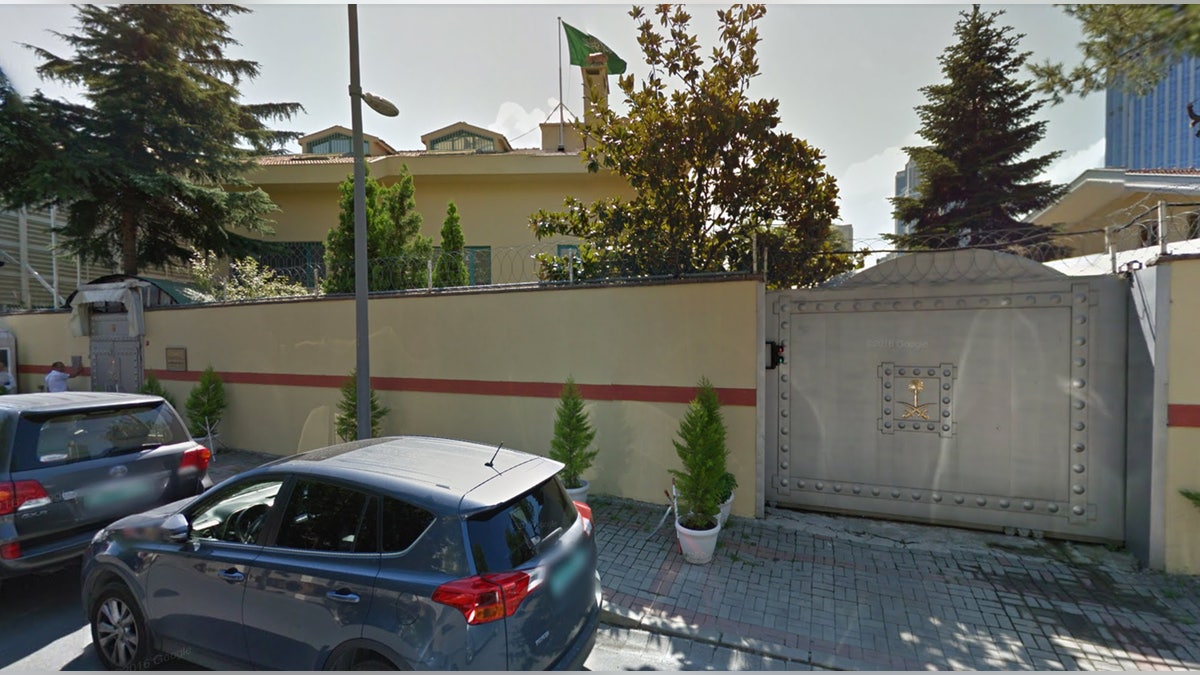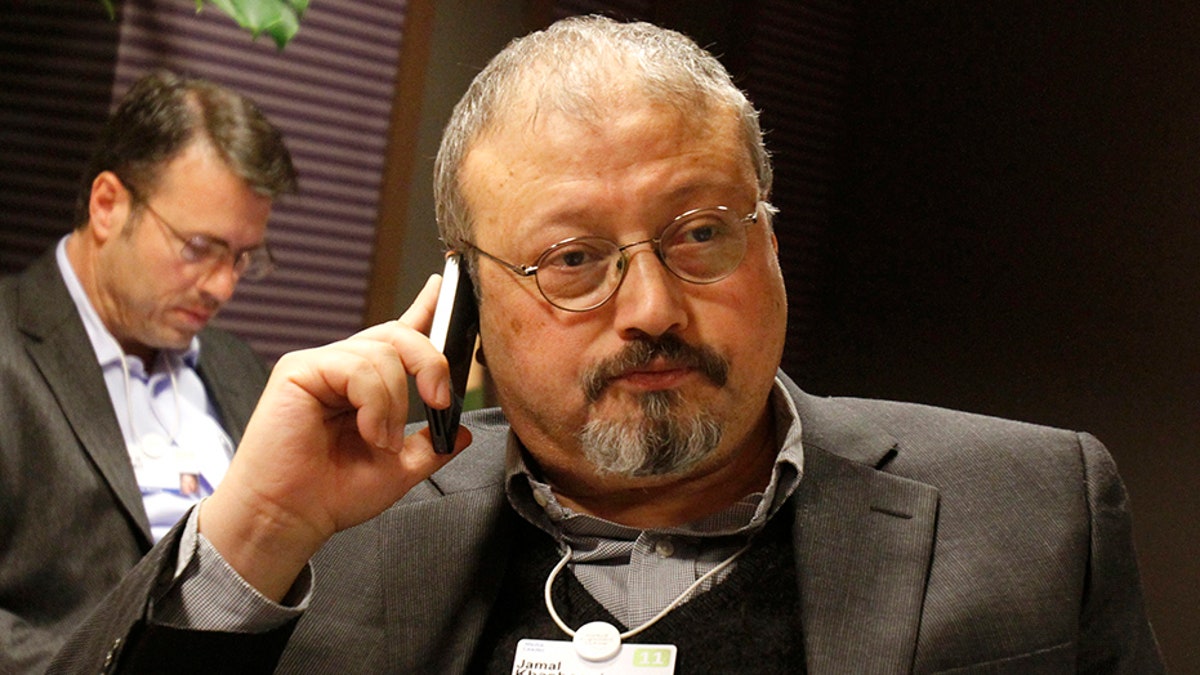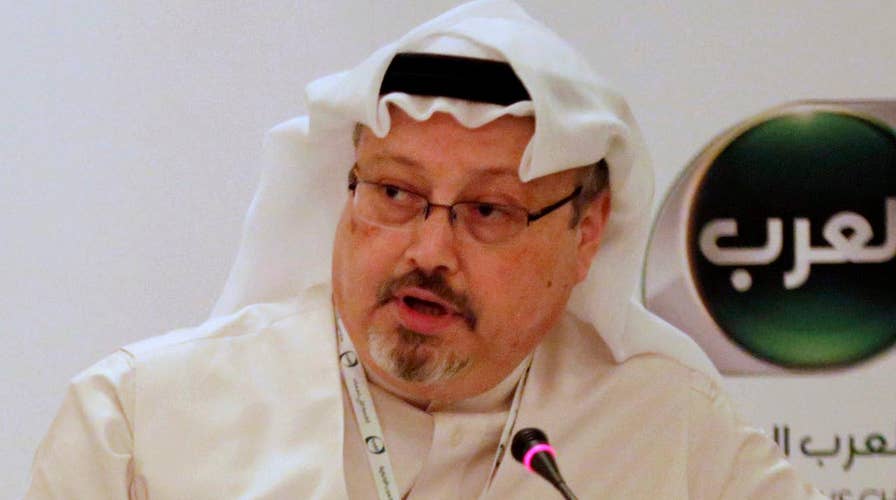Journalist reportedly killed at Saudi consulate in Istanbul
Washington Post sources calling contributor Jamal Khashoggi's death 'a preplanned murder'; Trey Yingst reports on the investigation in Turkey.
Turkish officials reportedly are demanding Saudi Arabia let investigators inside its Istanbul consulate Monday as international outcry grows amid fears that journalist Jamal Khashoggi was hacked to death inside its walls.
Khashoggi, a Washington Post contributor and frequent critic of the Saudi government, was last seen nearly a week ago entering the heavily-protected compound, which lies near the end of a tree-lined residential street and is guarded with thick doors and high walls topped with barbed wire.
The 59-year-old journalist went inside the property to obtain documents for his upcoming marriage to a Turkish woman. But a friend of his on Sunday said he was told by officials – whom he did not name – that Khashoggi was made to “faint” and then was dismembered.
His comments came following a Washington Post report over the weekend that Saudi Arabia allegedly sent a 15-member team to the property to carry out a “pre-planned murder.” The report cited two sources familiar with the ongoing Turkish investigation into Khashoggi’s whereabouts.
Saudi Arabia has denied the allegations and claims that Khashoggi left the facility on his own accord. Turkey though, on Monday, asked for permission to enter the consulate to search for clues on what may have happened to Khashoggi, according to Turkish broadcaster NTV.

The Saudi Arabian consulate in Istanbul, Turkey. Journalist Jamal Khashoggi has not been seen or heard from since he walked into the property nearly a week ago. (Google Maps)
The request came after the Turkish government was reported to have summoned the Saudi ambassador to ask for his country’s “full coordination” in the investigation.
Sen. Lindsey Graham, R-S.C., revealed Monday he spoke with Sens. Bob Corker, R-Tenn., and Ben Cardin, D-Md., about their concerns for Khashoggi. "We agree if there was any truth to the allegations of wrongdoing by the Saudi government it would be devastating to the US-Saudi relationship and there will be a heavy price to be paid — economically and otherwise," Graham tweeted.
An email from Saudi Crown Prince Mohammed bin Salman, sent to close contacts and obtained by Fox News, said: "Jamal is a Saudi citizen whose safety and security is a top priority for the Kingdom, just as is the case with any other citizen. We will not spare any effort to locate him, just as we would if it were any other Saudi citizen."
Turkish officials have told numerous media organizations they believed Khashoggi was killed inside the consulate and his body has been moved elsewhere, although they have not been forthcoming with any evidence proving so.
Turkish President Recep Tayyip Erdogan is also putting pressure on Saudi Arabia to back up its claims that Khashoggi walked out of the consulate, telling the media during a visit to Hungary that the Kingdom "cannot save themselves by saying he left," the Associated Press reported.
The Washington Post said Sunday that Saudi Arabia let a group of Reuters journalists inside the consulate to show that Khashoggi was not there – but described the gesture as a farce.
JAMAL KHASHOGGI'S FRIEND SAYS SAUDI JOURNALIST WAS 'KILLED IN A BARBARIC WAY'
“The contrived 'visit' inside the consulate arranged for Reuters journalists on Saturday does not alleviate worry about Mr. Khashoggi’s fate,” it’s editorial board wrote.
Khashoggi, in his columns, spoke out against Saudi Arabia’s crackdown on dissenters and had been living in the U.S. for the past year in a self-imposed exile.
"I have left my home, my family and my job, and I am raising my voice. To do otherwise would betray those who languish in prison. I can speak when so many cannot. I want you to know that Saudi Arabia has not always been as it is now. We Saudis deserve better," he wrote in one September 2017 piece.

Saudi Arabian journalist Jamal Khashoggi speaks on his cell phone at the World Economic Forum in Davos, Switzerland, in 2011. (AP)
The Washington Post has called on Turkey, Saudi Arabi, and the U.S. to come forward with answers to the questions surrounding Khashoggi’s disappearance.
“We are hoping against hope that Mr. Khashoggi is unharmed and will soon return to his writing desk,” its editorial board said. “If the reports of his murder prove true, grief must be accompanied by accountability for those who carried out the murder and those who ordered it.”
Amnesty International, meanwhile, said if Khashoggi was indeed killed, it “would be an abysmal new low” that “sends a shockwave among Saudi Arabian human rights defenders and dissidents everywhere, eroding any notion of seeking safe haven abroad.
“The Gulf Kingdom routinely uses draconian laws to crack down on peaceful dissent at home, and has even arrested dissidents abroad in the past,” Amnesty International’s Middle East Research Director Lynn Maalouf said. “But the enforced disappearance – and now reported assassination – of one of its citizens who had sought asylum abroad should set alarm bells ringing.”
Fox News' Mike Arroyo and Rich Edson contributed to this report.

